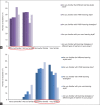Students awareness of learning styles and their perceptions to a mixed method approach for learning
- PMID: 26380214
- PMCID: PMC4552069
- DOI: 10.4103/2229-516X.162281
Students awareness of learning styles and their perceptions to a mixed method approach for learning
Abstract
Background: Individualization of instructional method does not contribute significantly to learning outcomes although it is known that students have differing learning styles (LSs). Hence, in order to maximally enhance learning, one must try to use a mixed method approach.
Hypothesis: Our hypothesis was that awareness of preferred LS and motivation to incorporate multiple learning strategies might enhance learning outcomes.
Aim: Our aim was to determine the impact of awareness of LS among medical undergraduates and motivating students to use mixed methods of learning.
Materials and methods: Before awareness lecture, LS preferences were determined using Visual, Aural, Read/Write, and Kinesthetic (VARK) questionnaire. Awareness of LS was assessed using a validated questionnaire. Through a lecture, students were oriented to various LSs, impact of LS on their performance, and benefit of using mixed method approach for learning. Subsequently, group discussions were organized. After 3 months, VARK preferences and awareness of LSs were reassessed. Student narratives were collected. Qualitative analysis of the data was done.
Results: There was a significant increase in the number of students who were aware of LS. The number of participants showing a change in VARK scores for various modalities of learning was also significant (P < 0.001).
Conclusion: Thus, awareness of LSs motivated students to adapt other learning strategies and use mixed methods for learning.
Keywords: Learning styles; mixed approach for learning; perceptions; student's awareness.
Figures
References
-
- Keefe JW. Reston, VA: National Association of Secondary School Principals; 1987. Learning Style: Theory and Practice.
-
- Bruner JS. Cambridge: Harvard University Press; 1967. Towards a Theory of Instruction.
-
- Norman G. When will learning style go out of style? Adv Health Sci Educ Theory Pract. 2009;14:1–4. - PubMed
-
- Cassidy S. Learning styles: An overview of theories, models, and measures. Educ Psychol. 2004;24:419–44.
-
- Coffield F, Moseley D, Hall E, Ecclestone K. Should we be using learning styles? What research has to say to practice? Learning and Skills Research Centre. 2004. [Last accessed on 2014 Dec 16]. Available from: http://www.LSRC.ac.uk /2014/December/.pdf .


